Are you frustrated with the daily struggles of tooth loss? If you are, you’re not alone. Millions of Americans experience the same difficulties. Poorly fitting dentures, aging dental bridges, or annoying spaces in the mouth can make everyday tasks like chewing, speaking, and even laughing and smiling difficult and embarrassing. But there is a solution. Dental implants in Costa Mesa, CA could solve all of your tooth loss problems permanently. Better yet, at Advanced Dental Care, our team can complete the entire dental implant treatment process in one location. Contact us today to schedule your consultation for a tooth replacement that lasts a lifetime!

Dental implants are a truly innovative form of tooth replacement. The implant itself is a small titanium cylinder that is meant to mimic the roots of a real tooth. Your implant dentist in Costa Mesa surgically places the post into a precise location in your jaw. The implant stimulates bone growth, allowing your jaw to fuse to it through a process called osseointegration. Once your jaw has healed, a metal abutment is placed onto the post to connect your custom-made crown, bridge, or denture, depending on the number of teeth you need to replace.
Due to their three-part structure, dental implants are able to look and function just like natural teeth. In fact, once the treatment process is complete, you might even forget which of your teeth are real and which are implants! You’ll be able to smile with confidence, speak clearly, and eat all of your favorite foods. To top it all off, dental implants are capable of lasting a lifetime if you take good care of them.

Compared to traditional tooth replacements, dental implant treatment tends to take longer. Depending on your situation and how many teeth are being replaced, the entire process can take anywhere from six months to a year to complete. However, the benefits offered by this solution make them worth the wait!
At Advanced Dental Care, we can save you the trouble of having to travel to various specialists for different phases of the treatment. Thanks to the expertise of our in-house oral surgeon, Dr. Kevin Coppelson , you can conveniently get every step of the process take care of under one roof. Each patient’s treatment will look slightly different, but here’s a basic outline of the four-step dental implant process.
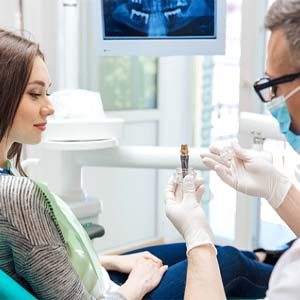
We’ll begin your journey to a new smile by reviewing your health history, examining your mouth, and discussing the specific goals you have in mind. From there, we can decide whether dental implants are the right way to replace your lost teeth. If so, we’ll start planning out the rest of your treatment.
Many patients require one or more preparatory procedures before their mouths are ready to support implants. For example, bone grafting might be necessary to build up jawbone density that has been lost after teeth went missing.

After you’ve completed any needed prep work, we can schedule your implant placement surgery with Dr. Coppelson. Because he is a Diplomate of the American Board of Oral and Maxillofacial Surgery, you can rest easy knowing that your future smile is in good hands.
The procedure itself is relatively simple, as far as oral surgeries go. Dr. Coppelson numbs your mouth and then makes small incisions at precise locations in your gum tissue. Through these incisions, he can position your dental implants at predetermined angles in your jaw. Then, he closes up your gums so that you can begin healing.
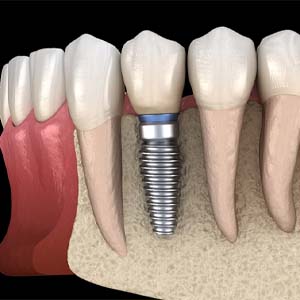
It will take about three to six months (depending on your body’s rate of healing) for the implants to merge with the tissues in your jawbone. This process is called osseointegration, and it’s the key to the unique benefits that dental implants provide.
Once your implants have successfully integrated, Dr. Coppelson will perform another surgical procedure to install abutments on top of your implants. Abutments are tiny metal attachments that will allow your personalized replacement teeth to be secured into place.
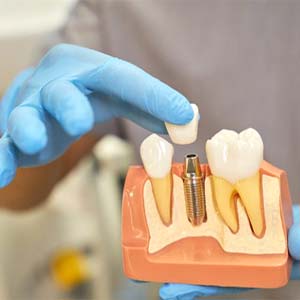
You’ll need a few weeks for your gums to heal from your abutment procedure. At that point, we can finally place your dental crown, bridge, or denture. This restoration will have been meticulously crafted so that it seamlessly blends in with your natural smile. Once we’ve placed it, we’ll guide you on how to care for your new pearly whites and help them last for a lifetime to come.

Often considered the gold standard for replacing missing teeth, many patients these days turn towards dental implants in Costa Mesa to assist their smiles. Thanks to their surgical placement inside the jawbone, this modern tooth loss solution also provides a vast array of impressive benefits that you don’t have access to through other options like dentures or bridges. Keep reading to learn a little more about these incredible benefits and how implants ultimately improve your quality of life!

Dental implants provide a significant and unparalleled upgrade to your smile; this means patients can experience several awesome advantages in their daily lives such as:
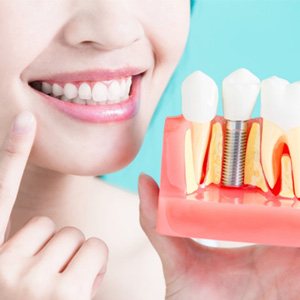
In addition to improving your daily quality of life, dental implants can provide you with several noteworthy health benefits like:

Dental implants are designed to be a permanent solution for missing teeth, meaning that they’re also accompanied by several long-term benefits including:

The ideal candidate for dental implants is someone with good general and oral health who has gum tissue that’s free of periodontal disease and adequate bone in the jaw to support the implant. If your jawbone isn't thick enough, you may need bone grafting before you can have dental implant surgery. A bone graft can create a more solid base for your implant. Generally, dental implants can be used to restore the oral health of patients who:

A single porcelain dental crown supported by a dental implant root can be placed between two healthy teeth without disrupting them at all. This is a much more conservative solution compared to a regular bridge, in which the neighboring teeth have to be filed down.

For patients with nonconsecutive missing teeth, implants can be used to hold multiple crowns throughout the mouth and even a partial denture. If a patient has larger gaps in their smile because of consecutive missing teeth, just two implants can support a strong and reliable bridge.

Patients who are missing most of their teeth tend to suffer from significant issues, but an implant denture can quickly fix all of them. Using just four to six strategically positioned implant roots, a custom-made prosthetic can be attached directly to the jaw to give a patient a set of teeth they can trust, whether they are smiling or biting into their favorite food.

Our team is able to use dental implants to replace any number of teeth, and because of this, the cost of the procedure can vary quite a bit from person to person based on their particular needs. Before we begin your treatment, we’ll go over all pricing information so you’ll know exactly what you’ll be expected to pay (as well as how we can use your insurance/financing to make the treatment more affordable). While dental implants do tend to cost more than traditional bridges and dentures, they are also able to last for decades longer, which usually ends up saving patients money in the end because they don’t have to have their teeth periodically redone.

It’s difficult to give a general range for the price of a dental implant treatment since every case of tooth loss is different. When you’ve only lost one tooth, you only need to get one dental implant and a crown to replace it. On the other hand, multiple implant posts and full dentures could be required in more extensive cases of tooth loss. You can generally expect the number of implant posts and the type of prosthetic needed to have a major influence on the cost of your new smile. That’s why the initial consultation – where we examine your mouth and determine your specific needs – is such an important step.

When you’re making a payment plan for your dental implants, you need to remember that each stage of the procedure has its own separate cost. First, you may or may not need to undergo bone grafting or another procedure to ensure your mouth is at optimal health. Then there’s the surgery to place the implants in your mouth (which can be conveniently performed in-office by our oral surgeon Dr. Coppelson, meaning you won’t have to worry about paying for treatment from an unfamiliar specialist at a practice across town). During this procedure, you may have to factor in the cost of IV sedation or another service used to keep you relaxed and comfortable. The surgery isn’t the final step; once your mouth has healed, you’ll need to pay to have an abutment placed, and you’ll receive your new teeth during the final stage.

You might feel uneasy about paying for dental implants when you compare it to the initial cost of other procedures. However, bear in mind that getting dental implants affords you multiple benefits, including:
It should also be kept in mind that dental implants require very little in the way of special maintenance yet can last for the rest of your life. As a result, you may end up paying less for implants than you would for dentures that need to be relined or a dental bridge that will eventually be replaced.

Our office is in network with most major insurances (including MetLife, Aflac, Delta Dental, Liberty Dental, and many more), and we strongly urge all of our patients to review their benefits before committing to any kind of treatment. Some plans will pay for the implant surgery itself; other carriers won’t cover implants but may help mitigate the cost of restoration and other related procedures.
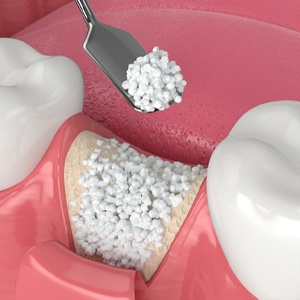
There are many factors that come into play for dental implants, which means that certain obstacles can make treatment more difficult. However, we have the training and expertise to handle advanced dental implant procedures in Costa Mesa, such as bone grafting, sinus lifts, and more. You shouldn’t let little problems stand in between you and a completely restored smile. When we meet for your consultation, we can talk about any preliminary procedures you may need to ensure that your implants are successful.
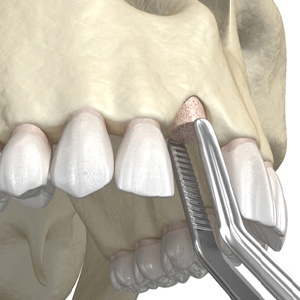
Whether you lost your teeth a long time ago or just yesterday, sometimes the jawbone doesn’t have enough density to support successful dental implants. The good news is that we can bolster the bone through a graft. We can either utilize a small fragment from another part of your body or take a graft from a donor and then put it in the places where your implant posts will go. The graft becomes integrated with your jawbone, making it more robust and better able to guarantee successful implantation.
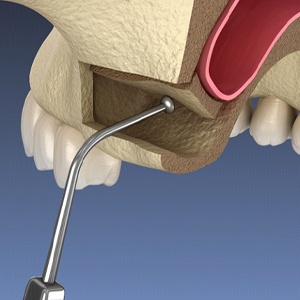
The upper jawbone tends to weaker in strength and density than the lower jaw because of its proximity to the sinus cavity. In fact, the location of the sinus membrane can complicate bone grafts for the upper jaw. In this situation, a sinus lift may be required before the graft. This procedure involves going through the gums, making a small hole in the bone, and physically lifting this membrane to make room for the graft. As a result, the grafting material and the implants can fit more comfortably in this area. Keep in mind that this procedure can take between 4 and 12 months for you to fully recover.
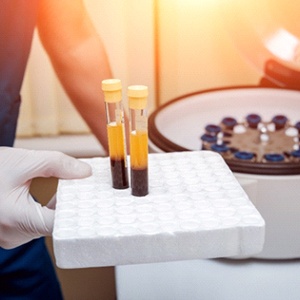
Platelet-rich plasma (PRP) and platelet-rich fibrin (PRF) have long been used for the healing and regeneration of certain kinds of cells. We can utilize your own blood and this advanced procedure to your advantage when it comes to implants. By using PRP/PRF therapy, we can help your body recover more effectively and quickly from grafts or other procedures. As a result, your jawbone and gums can be ready to move forward with the placement procedure and take you one step closer to your new smile.
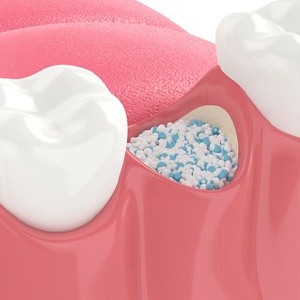
In addition to the right height, your jawbone must have enough width to support your teeth and implants. For some patients, the jawbone ridge can become narrow to the point that more bone tissue is needed to position the implants inside. In a procedure called a ridge expansion, we insert wedges into the jawbone, which widen the ridge. This allows us to place bone grafts in the ridge and eventually implants in the middle.

Because of Dr. Kevin Coppelson’s advanced training in oral surgery, our team is able to conveniently complete every step of the dental implant process in-house. This means that after your surgery, we can provide you with dental implant post-op instructions in Costa Mesa that have been personalized for your specific case. While every patient’s needs are slightly different, below you’ll find some basic tips on what to expect when recovering from dental implant surgery.

In order for your gums to heal around the implant, a blood clot must form and remain undisturbed for several days. If the blood clot is dislodged, dry socket can occur. Not only is dry socket painful, but it can lengthen the healing process. To prevent dry socket and encourage a speedy recovery, make sure to AVOID:

If this is your first experience with oral surgery, it can be hard to discern which symptoms are normal and which ones warrant concern. As time passes, you should feel the initial discomfort fading away. However, if your pain seems to be worsening instead of subsiding, promptly call your implant dentist in Costa Mesa. That way, we can determine the cause of the issue and treat it accordingly.
During the first few days of recovery, you can expect these common side effects:

After receiving dental implants in Costa Mesa, it’s best to maintain a soft food diet for the next several days. We recommend stocking up on foods like yogurt, mashed potatoes, scrambled eggs, and pasta. You can even take this time to treat yourself to some ice cream!
Once your soreness has dissipated, you should be able to gradually resume your normal diet. Avoid placing too much pressure on the implant site, though; chewing directly on the area could impact the osseointegration process.

Oral hygiene is one of the most crucial components of successful dental implant aftercare in Costa Mesa. If you don’t keep your mouth clean, the implant posts may not be able to fuse with your jawbone.
For the first few days after your procedure, you can and should brush and floss as you would ordinarily. Just be careful when you’re near the surgical site. You should also rinse your mouth with a saltwater solution (half a teaspoon of table salt in a glass of warm water) two or three times per day. Ideally, you should rinse after every meal and snack. If we have prescribed a particular mouth rinse for you, use that as instructed. Avoid using mouthwash that contains alcohol, though, as it could inhibit healing.

When you’ve finished healing and your dental implants are firmly embedded in your jaw, it’s time to finally receive your new teeth! After we’ve placed your crown, bridge, or denture on top of your abutment, it’s normal to feel minor sensitivity in the nearby gum tissue. However, it’s nothing that an over-the-counter pain reliever shouldn’t be able to handle. Let us know right away if you experience bleeding, swelling, or intense pain, as these symptoms indicate that something may be wrong.
By following all of these tips to a tee, you can expect your new smile to have the healthy foundation it needs to thrive!

When you first get dental implants, you may be worried about your ability to take care of them. While this is understandable, there is really nothing to worry about; dental implant maintenance is actually quite simple, and in many respects, it isn’t all that different from taking care of natural teeth. In order to help you start preparing for life with dental implants, take a look at the following tips for protecting your new smile.

To ensure that your dental implants continue to receive the support they require, you need to protect the tissues around them from gum disease. As such, you should be brushing and flossing every day to get rid of the bacteria and food particles that could eventually lead to a gum infection. Pay close attention to the area around your implants, and try to be as thorough as possible while brushing; it can be all too easy to miss a spot without realizing it.

While there’s no need to cut sweets and other sugary foods completely out of your diet, you do want to be careful about not consuming too much sugar; doing so could increase your chances of developing gum disease. We recommend focusing on foods that will help you maintain a healthy environment for your dental implants. In particular, make sure that you’re getting plenty of calcium and vitamin C. Generally speaking, your diet should include a mix of fruits, vegetables, lean proteins, and dairy products.

Habits like chewing on your fingernails or opening packages with your teeth might not seem like they can damage your dental implants, but given enough time they can cause serious problems for your smile. Your best option is to put a stop to these habits as quickly as possible. It may help to look for more beneficial habits that you can pick up instead. For example, if you have a habit that involves chewing, keep some sugar-free gum on you. Believe it or not, sugar-free gum can actually be useful for keeping your smile clean.

Even the sturdiest dental implant can potentially be broken. You can’t always avoid accidents, but you can take steps to keep your dental implants safe. For example, if you play sports, it’s typically a good idea to wear a mouthguard even if you’re not told that one is required. A similar device called a nightguard can help keep your dental implant safe from any teeth grinding or clenching that might occur at night.

Whenever you visit our office for a checkup, we will give your dental implants the same level of attention that we give the rest of your smile. If there’s anything that you need to be concerned about, we will inform you immediately so that you can hopefully avoid more serious issues.
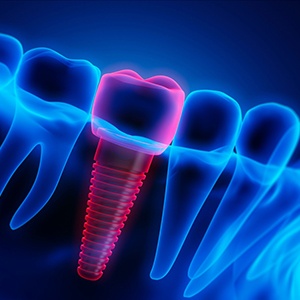
Dental implants are a consistently successful treatment; they thrive in more than 95% of cases. Of course, that does leave the small chance that something will go wrong with your new teeth. If you ever believe that you are in danger of experiencing dental implant failure, get in touch with our team right away. We will carefully assess the situation, determine the cause of the problem, and recommend your next steps. Our goal is to get your smile’s health back on track as quickly and conservatively as possible.
Learn More About Dental Implant Failure & Salvage
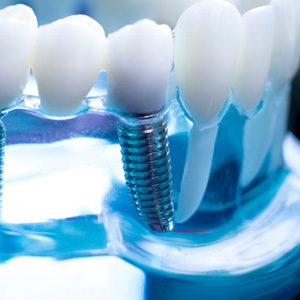
At Advanced Dental Care, our team strives to make dental implant treatment as smooth and successful as possible. It’s only natural that we rely on the latest implant technology to fulfill this key commitment. Such tools and software let us make and place exceptional replacement teeth, ensuring your restoration work is truly excellent. We’ll even tell you more about them if you’d like further details. To that end, simply keep reading or call us for a chat soon.
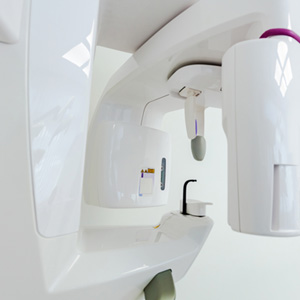
Digital X-rays are great at showing hidden oral structures, but they have limits in dental implant work. That’s where our practice’s CBCT machine takes over.
Also known as a cone beam scanner, a CBCT machine produces a 3D scan of your mouth with minimal radiation. This scan shows intricate details – nerve pathways, blood vessels, etc. – that a digital X-ray just can’t capture very well. Given that fact, our office uses the CBCT machine to plan the placement of your dental implants precisely and enhance the success of your treatment. This approach minimizes the chance of unexpected issues during surgery and helps your final implants work even better!
Rest assured that you won’t need special preparation for 3D cone beam imaging. At most, we’ll have you remove anything that interferes with it – jewelry, eyeglasses, hairpins, hearing aids, etc. Our team will let you retrieve these items after the scans are done.
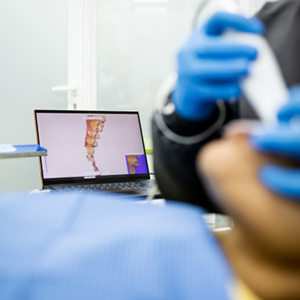
After placing your implant posts, we’ll “cap” them with dental crowns. Our team will use a digital impression system for that latter step.
A digital impression system has non-contact methods to get detailed impressions of your mouth. In particular, it takes precise scans of your teeth, bite, and oral tissues without using “goopy” putty. This system is thus more accurate and comfortable than those of previous decades. Its scans allow lab workers to design and make lifelike restorations that blend seamlessly with your smile.
We often use our digital impression system during the dental implant consultation. At that visit, we’ll take the required scans as part of the patient’s preparation for implant surgery. This measure saves time (for both you and our practice) and helps your final implants look just right!

Although dental implants in Costa Mesa are the most reliable solution for tooth loss, it’s normal to have a few concerns before you’re ready to commit to them. There isn’t any reason to worry. Here are the answers to the most common questions our patients ask us about dental implants.
Dental implants are the most successful method to replace missing teeth. They are proven to last for 30 years or more, which is decades longer than traditional bridges and dentures. Various factors influence the lifespan of dental implants, such as your oral health and lifestyle habits. You can ensure your new smile flourishes for years by brushing at least twice a day, flossing daily, and using an antimicrobial mouthrinse. You’ll also want to avoid anything that might damage your new smile, like foods that are too hard or sticky. Your implant dentist in Costa Mesa recommends you don’t use your teeth as tools or chew on inedible objects. Don’t forget to visit your dentist at least twice a year for a cleaning and checkup.
A dental implant is supported by a titanium post that’s surgically placed into the jawbone. It serves as a root, which allows the bone to fuse to it through a process called osseointegration. As a result, you cannot remove a dental implant on your own. Only a qualified dental professional can take it out; however, some implant dentures can be removed for cleaning.
You don’t need to worry about a painful procedure because your dentist will use a local anesthetic or sedative to ensure you are comfortable. Although you won’t feel anything during your surgery, it’s normal for your mouth to be a bit tender for a few days afterward, but you can manage it using OTC pain medications. Applying a cold compress to the outside of your mouth will also reduce pain, inflammation, and bruising. After your mouth has healed, your dental implant should feel like a real tooth. Any discomfort will originate from the surrounding tissues because dental implants don’t have any nerves. If you develop pain after you’ve healed, don’t wait to contact your dentist. They will find the source of the issue to prevent dental implant failure.
Generally, if you have good oral and general health, dental implants are a safe solution to rebuild your smile; however, you still need a consultation with your dentist. They’ll assess your oral health to look for any issues that might cause complications, like gum disease or bone loss. Any concerns will need to be resolved before moving forward. Your dentist will also take the time to learn more about your medical history. Certain preexisting conditions can increase your risk of complications, like diabetes or cancer. If you have an underlying medical issue, that doesn’t disqualify you from getting dental implants. Instead, your dentist will take extra measures to ensure your safety and the success of your treatment.
I Need a Checkup & Cleaning I am Looking for a Dentist for My Child I am Concerned About Bleeding Gums I Have a Cavity or Broken Tooth I am Missing One or More Teeth I am Unhappy with My Smile I Want a Straighter Smile I am Scared of the Dentist I am In Pain & Need Help I Need My Wisdom Teeth Removed View Our Services